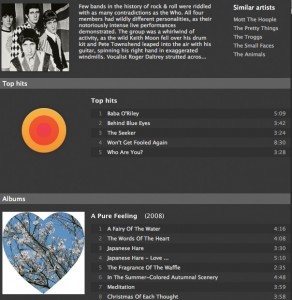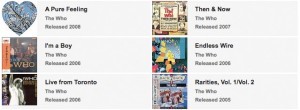 I was slightly entertained by this, so I thought I had better share. It’s a good example of how a central data store shared by a number of third party services can be effected by one small mistake.
I was slightly entertained by this, so I thought I had better share. It’s a good example of how a central data store shared by a number of third party services can be effected by one small mistake.
And if this kind of screw up can have a wide-reaching effect on cataloguing CDs, just think on the kind of effect an incorrect piece of data on a government controlled database could have.
Most people know I’m a classic rock fan. Despite being born in ’83 I missed most of the ’90s and found much more interesting music from the ’60s and ’70s. For those that don’t know,
Spotify is a great little service that streams free music to your Mac (or PC) with advertisements every few tracks. What sets Spotify apart from other services is its level of convenience (it just works) and a huge catalogue.
Yesterday I decided to listen to as much of The Who as I could get my hands on. Spotify gleefully reported what looked at first glance like a full discography. At the top of this list, I noticed a new album “A Pure Feeling”. WOW! A NEW WHO ALBUM! I eagerly selected it expecting great guitar, melodic vocal and a beat you could shake your ass to. So I was a little bewildered to hear … zen instrumental.
 Well okay. Rock bands have been known to try out alternate sounds, maybe this was a new direction? Amazon was also in agreement that this was “The Who” we knew and loved, as was Zune.com. It was odd I thought that I had not heard anything about it. Someone on my various social networks would surely have made mention of a new album by The Who. I mean, it’s a slightly bigger name than Stircrazy for example. But, websites were in agreement, this was The Who.
Well okay. Rock bands have been known to try out alternate sounds, maybe this was a new direction? Amazon was also in agreement that this was “The Who” we knew and loved, as was Zune.com. It was odd I thought that I had not heard anything about it. Someone on my various social networks would surely have made mention of a new album by The Who. I mean, it’s a slightly bigger name than Stircrazy for example. But, websites were in agreement, this was The Who.
 I then found a link in emusic who reported “A Pure Feeling” as “Who” and not “The Who”. Suddenly things made a little more sense. Admittedly this was only a couple of minutes of confusion, but it was confusion nonetheless.
I then found a link in emusic who reported “A Pure Feeling” as “Who” and not “The Who”. Suddenly things made a little more sense. Admittedly this was only a couple of minutes of confusion, but it was confusion nonetheless.
But it does bring into stark relief the need for centralised systems to be accurate. If one system is the authority that others base themselves on and a single error occurs at this point then it will inevitably cause confusion. And if all other points of comparison also take their reference from their same place, then at what point do we know an error has occurred?
In the bigger, wider world outside of music (it does exist), one of the advantages of having multiple points of reference for identity is that they can be used to cross-check against each other. Passport and driving-license don’t agree? Either something dodgy is going on or an honest mistake has occurred. Either way there is doubt. If you’re only required piece of identification is a small piece of plastic and a single row on a database table, whose to doubt that you’re really who you say you are or more importantly who you are is who your card says you are. Rather than helping to combat terrorism, ID cards provide terrorists with the perfect cover. Whose going to argue with the government approved identity scheme?
You may now want to look in to No2ID.
 There are no ads on this blog and as far as I can remember, never have been.
There are no ads on this blog and as far as I can remember, never have been.